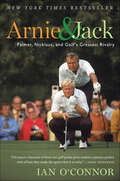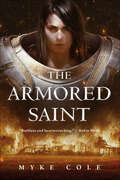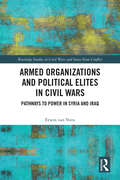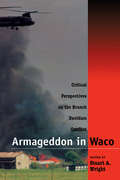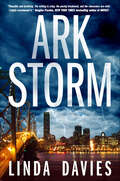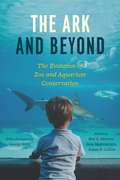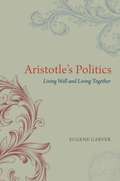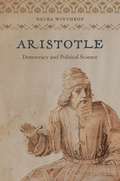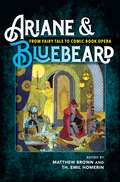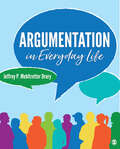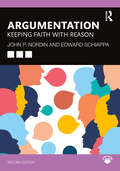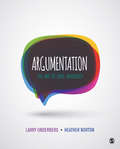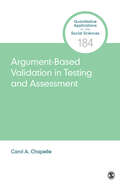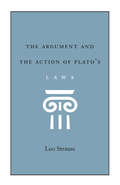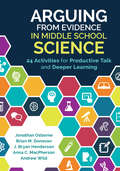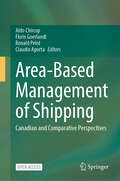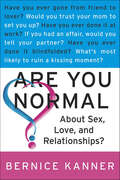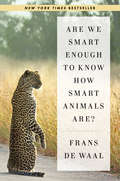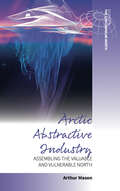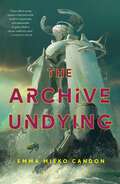- Table View
- List View
Aromaterapia: Le virtù terapeutiche degli oli essenziali
by Dr Angela FetznerLe virtù terapeutiche degli oli essenziali ci permettono di contribuire in modo molto gradevole alla nostra salute psichica e fisica. Infatti, il profumo benefico degli oli essenziali può influenzare il nostro umore e avere un effetto positivo sul nostro stato d’animo e sul nostro corpo. L'aromaterapia impiega gli oli essenziali, avvalendosi delle loro proprietà, per ottenere determinati effetti. L'energia terapeutica e la forza vitale concentrata delle sostanze naturali garantiscono armonia, equilibrio e salute duratura. Care lettrici e cari lettori, vorrei invitarvi ad accompagnarmi in un interessante viaggio nel mondo degli oli essenziali. L’autrice, che ha conseguito il dottorato in Storia della Farmacia (Dr. rer. Nat.), assiste e informa numerosi clienti da più di vent’anni. In qualità di autrice indipendente e farmacista, l'autrice di questo libro si impegna esclusivamente per la salute e il benessere delle persone. Confrontate il numero di pagine e la qualità prima di acquistare un e-book o un libro in formato tascabile. - Utilizzate la funzione anteprima. Questo libro, nel formato tascabile, conta 120 pagine reali ed è stato scritto da un’esperta, a differenza dei testi di 20 o 30 pagine realizzati da autori fittizi tramite il copia e incolla da Internet.
Arnie & Jack: Palmer, Nicklaus, and Golf's Greatest Rivalry
by Ian O'ConnorA Sports Illustrated Top Ten Book of the Year and New York Times bestseller from ESPN.com's Ian O'Connor, Arnie & Jack: Palmer, Nicklaus, and Golf's Greatest Rivalry is a revelatory look at the relationship between two legendary champions.Surprisingly, one of sport’s most contentious, complex, and defining clashes played out not in the boxing ring or at the line of scrimmage but on the genteel green fairways of the world’s finest golf courses. Arnie and Jack. Palmer and Nicklaus. Their fifty-year duel, in both the clubhouse and the boardroom, propelled each to the status of American icon and pushed modern golf into mainstream popularity.Arnie was the cowboy, with rugged good looks, Popeye-like forearms, a flailing swing, and charm enough to win fans worldwide. Jack was scientific, precise, conservative, aloof, even fat and awkward. Ultimately, Nicklaus got the better of Palmer on the course, beating him in major victories 18-7. But Palmer bested Nicklaus almost everywhere else, especially in the hearts of the public and in endorsement dollars. By the end of this page-turning narrative, we see that each man wanted what the other had: Arnold wanted the trophies. Jack wanted the love.In the tradition of John Feinstein and Mark Frost, Ian O’Connor has written a compelling account of one of the greatest rivalries in sports history.
The Armored Saint (The Sacred Throne #1)
by Myke Cole"Cole weaves a fantasy world that feels comfortably familiar, then goes to places you’d never expect. You won’t stop turning pages until the stunning finish." —Peter V. BrettMyke Cole, star of CBS's Hunted and author of the Shadow Ops series, debuts the Sacred Throne epic fantasy trilogy with The Armored Saint, a story of religious tyrants, arcane war-machines, and underground resistance that will enthrall epic fantasy readers of all ages.In a world where any act of magic could open a portal to hell, the Order insures that no wizard will live to summon devils, and will kill as many innocent people as they must to prevent that greater horror. After witnessing a horrendous slaughter, the village girl Heloise opposes the Order, and risks bringing their wrath down on herself, her family, and her village.At the Publisher's request, this title is being sold without Digital Rights Management Software (DRM) applied.
Armed Organizations and Political Elites in Civil Wars: Pathways to Power in Syria and Iraq (Routledge Studies in Civil Wars and Intra-State Conflict)
by Erwin van VeenThis book analyses under what conditions, and with what developmental effects, armed organizations shift their ‘coercive profile’ during civil wars, with a focus on the recent conflicts in Syria and Iraq.The work begins with an operationalisation of the term ‘political settlement’, focusing on how power is organized in fragile and conflict-affected countries, and then uses this operationalization to analyse the political settlements of contemporary Syria and Iraq, including their breakdown and transformation during recent civil wars (of 2011-today in Syria and 2014-17 in Iraq). It subsequently examines why and how elite factions have used armed organizations in times of conflict. This approach links an understanding of the broad evolution of power relations at the national level with the specific effects of the use of armed organizations on such relations. It argues for a shift from assigning fixed labels to armed organizations during civil wars to studying their coercive profile in a dynamic fashion, i.e. how armed organizations behave in terms of their use of threats and coercive force. The book introduces five profiles of coercive behaviour that demonstrate how the same organization can behave very differently at various points in time. One of these, the ‘hybrid coercive profile’, fills a gap in the existing civil war typology of organized armed violence by opening up the possibility of elite factions deliberately combining collaborative and competitive modes of behaviour. As an evidence base, the book provides in-depth analysis of the origins, evolution and operations of four armed organizations that have acted under a hybrid coercive profile during the Syrian and Iraqi civil wars: the Syrian Kurdish People’s Defence Forces, the Eagles of the Whirlwind of the Syrian Social Nationalist Party, the Iraqi Kurdish Peshmerga and the Badr Organization. By connecting the concepts of political settlement and civil war, and applying them to specific armed organizations operating in Syria and Iraq, the book offers new insights into this nexus.This book will be of much interest to students of civil wars, conflict studies, Middle Eastern Studies and International Relations.
Armageddon in Waco: Critical Perspectives on the Branch Davidian Conflict
by Stuart A. WrightOn February 28, 1993, the United States Bureau of Alcohol, Tobacco, and Firearms (BATF) launched the largest assault in its history against a small religious community in central Texas. One hundred agents armed with automatic and semi automatic weapons invaded the compound, purportedly to execute a single search and arrest warrant. The raid went badly; four agents were killed, and by the end of the day the settlement was surrounded by armored tanks and combat helicopters. After a fifty-one day standoff, the United States Justice Department approved a plan to use CS gas against those barricaded inside. Whether by accident or plan, tanks carrying the CS gas caused the compound to explode in fire, killing all seventy-four men, women, and children inside. Could the tragedy have been prevented? Was it necesary for the BATF agents to do what they did? What could have been done differently? Armageddon in Waco offers the most detailed, wide-ranging analysis of events surrounding Waco. Leading scholars in sociology, history, law, and religion explore all facets of the confrontation in an attempt to understand one of the most confusing government actions in American history. The book begins with the history of the Branch Davidians and the story of its leader, David Koresh. Chapters show how the Davidians came to trouble authorities, why the group was labeled a "cult," and how authorities used unsubstantiated allegations of child abuse to strengthen their case against the sect. The media's role is examined next in essays that considering the effect on coverage of lack of time and resources, the orchestration of public relations by government officials, the restricted access to the site or to countervailing evidence, and the ideologies of the journalists themselves. Several contributors then explore the relation of violence to religion, comparing Waco to Jonestown. Finally, the role played by "experts" and "consultants" in defining such conflicts is explored by two contributors who had active roles as scholarly experts during and after the siege The legal and consitutional implications of the government's actions are also analyzed in balanced, clearly written detail.
Ark Storm: A Novel
by Linda DaviesThe Ark Storm is coming—a catastrophic weather event that will unleash massive floods and wreak more damage on California than the feared "Big One." One man wants to profit from it. Another wants to harness it to wage jihad on American soil. One woman stands in their way: Dr. Gwen Boudain, a brave and brilliant meteorologist. When Boudain notices that her climate readings are off the charts, she turns to Gabriel Messenger for research funding. Messenger's company is working on a program that ionizes water molecules to bring rain on command. Meanwhile, Wall Street suits notice that someone is placing six-month bets on the prospect of an utter apocalypse and begin to investigate. Standing in the shadows is journalist Dan Jacobsen, a former Navy SEAL. War hardened, cynical, and handsome, Jacobsen is a man with his own hidden agenda.Linda Davies's Ark Storm brings together the worlds of finance, scientific innovation, and terrorism in a fast-paced thrill ride that will leave readers gasping.At the Publisher's request, this title is being sold without Digital Rights Management Software (DRM) applied.
The Ark and Beyond: The Evolution of Zoo and Aquarium Conservation (Convening Science: Discovery At The Marine Biological Laboratory Ser.)
by Ben A. Minteer Jane Maienschein James P. CollinsScores of wild species and ecosystems around the world face a variety of human-caused threats, from habitat destruction and fragmentation to rapid climate change. But there is hope, and it, too, comes in a most human form: zoos and aquariums. Gathering a diverse, multi-institutional collection of leading zoo and aquarium scientists as well as historians, philosophers, biologists, and social scientists, The Ark and Beyond traces the history and underscores the present role of these organizations as essential conservation actors. It also offers a framework for their future course, reaffirming that if zoos and aquariums make biodiversity conservation a top priority, these institutions can play a vital role in tackling conservation challenges of global magnitude. While early menageries were anything but the centers of conservation that many zoos are today, a concern with wildlife preservation has been an integral component of the modern, professionally run zoo since the nineteenth century. From captive breeding initiatives to rewilding programs, zoos and aquariums have long been at the cutting edge of research and conservation science, sites of impressive new genetic and reproductive techniques. Today, their efforts reach even further beyond recreation, with educational programs, community-based conservation initiatives, and international, collaborative programs designed to combat species extinction and protect habitats at a range of scales. Addressing related topics as diverse as zoo animal welfare, species reintroductions, amphibian extinctions, and whether zoos can truly be “wild,” this book explores the whole range of research and conservation practices that spring from zoos and aquariums while emphasizing the historical, scientific, and ethical traditions that shape these efforts. Also featuring an inspiring foreword by the late George Rabb, president emeritus of the Chicago Zoological Society / Brookfield Zoo, The Ark and Beyond illuminates these institutions’ growing significance to the preservation of global biodiversity in this century.
Aristotle's Politics: Living Well and Living Together
by Eugene Garver“Man is a political animal,” Aristotle asserts near the beginning of the Politics. In this novel reading of one of the foundational texts of political philosophy, Eugene Garver traces the surprising implications of Aristotle’s claim and explores the treatise’s relevance to ongoing political concerns. Often dismissed as overly grounded in Aristotle’s specific moment in time, in fact the Politics challenges contemporary understandings of human action and allows us to better see ourselves today. Close examination of Aristotle’s treatise, Garver finds, reveals a significant, practical role for philosophy to play in politics. Philosophers present arguments about issues—such as the right and the good, justice and modes of governance, the relation between the good person and the good citizen, and the character of a good life—that politicians must then make appealing to their fellow citizens. Completing Garver’s trilogy on Aristotle’s unique vision, Aristotle’s Politics yields new ways of thinking about ethics and politics, ancient and modern.
Aristotle: Democracy and Political Science
by Delba WinthropToday, democracy is seen as the best or even the only legitimate form of government—hardly in need of defense. Delba Winthrop punctures this complacency and takes up the challenge of justifying democracy through Aristotle’s political science. In Aristotle’s time and in ours, democrats want inclusiveness; they want above all to include everyone a part of a whole. But what makes a whole? This is a question for both politics and philosophy, and Winthrop shows that Aristotle pursues the answer in the Politics. She uncovers in his political science the insights philosophy brings to politics and, especially, the insights politics brings to philosophy. Through her appreciation of this dual purpose and skilled execution of her argument, Winthrop’s discoveries are profound. Central to politics, she maintains, is the quality of assertiveness—the kind of speech that demands to be heard. Aristotle, she shows for the first time, carries assertive speech into philosophy, when human reason claims its due as a contribution to the universe. Political science gets the high role of teacher to ordinary folk in democracy and to the few who want to understand what sustains it. This posthumous publication is more than an honor to Delba Winthrop’s memory. It is a gift to partisans of democracy, advocates of justice, and students of Aristotle.
Ariane & Bluebeard: From Fairy Tale to Comic Book Opera
by Matthew Brown and Th. Emil HomerinMaurice Maeterlinck described his libretto Ariane et Barbe-bleue as "a sort of legendary opera, or fairy [opera], in three acts." In 1907, Paul Dukas finished setting Maeterlinck's libretto to music, and the opera's Paris premiere was lauded as a landmark in operatic history. Ariane & Bluebeard: From Fairy Tale to Comic Book Opera offers a comprehensive, interdisciplinary look at this historic opera, including its structure, reception, and cultural implications. This lively collection juxtaposes chapters from experts in music, literature, the visual arts, gender studies, and religion and philosophy with vibrant illustrations by comic artist P. Craig Russell and interviews with performers and artists. Featuring material from newly discovered documents and the first English translation of several important sources, Ariane & Bluebeard allows readers to imagine the operain its various incarnations: as symbolist show, comic book, children's fairy tale, and more.
Argumentation in Everyday Life
by Jeffrey P. Drury"Good coverage of concepts with understandable explanations of theory. Very user friendly with exercises to use in and out of class. Connects well with other communication classes through the application of other communication concepts to argumentation." —Christopher Leland, Azusa Pacific University Argumentation in Everyday Life provides students with the tools they need to argue effectively in the classroom and beyond. Jeffrey P. Mehltretter Drury offers rich coverage of theory while balancing everyday applicability, allowing students to use their skills soundly. Drury introduces the fundamentals of constructing and refuting arguments using the Toulmin model and ARG conditions (Acceptability, Relevance, and Grounds). Numerous real-world examples are connected to the theories of rhetoric and argumentation discussed—enabling students to practice and apply the content in personal, civic, and professional contexts, as well as traditional academic debates. Encouraging self-reflection, this book empowers students to find their voice and create positive change through argumentation in everyday life. Unique resources to help students navigate this complex terrain of argumentation: "The Debate Situation" offers students a birds-eye view of any given debate (or exchange of arguments between two or more people) organized around three necessary components: arguments, issues, and the proposition. The visual model of the debate situation illustrates how these features work together in guiding a debate and it lays the groundwork for understanding and generating arguments. Easy to Use Standards for Evaluating Arguments combine a prominent argument model (named after logician Stephen Toulmin) with a standards-based approach (the ARG conditions) to test of quality of an argument. The ARG conditions are three questions an advocate should ask of an argument in determining whether or not it is rationally persuasive. These questions are best served by research but don’t necessary require it, and thus they provide a useful posture for critically assessing the arguments you encounter. Multiple "Everyday Life" examples with an emphasis on context help students to connect the lessons more fully to their everyday life and encourages them to grapple explicitly with dilemmas arising in different contexts. "Find Your Voice Prompts" focus on choice & empowerment to offer strategies for students to choose which arguments to address and how to address them—empowering students to use argumentation to find their voice. "Build Your Skill Prompts" use objective applications to test how well students have learned the information. They offer a chance to apply the material to additional examples that students can check against the answers in Appendix II. Two application exercises at the end of each chapter encourage students to think critically about the content, discuss their thoughts with their peers, and apply the material to everyday situations.
Argumentation in Everyday Life
by Jeffrey P. Drury"Good coverage of concepts with understandable explanations of theory. Very user friendly with exercises to use in and out of class. Connects well with other communication classes through the application of other communication concepts to argumentation." —Christopher Leland, Azusa Pacific University Argumentation in Everyday Life provides students with the tools they need to argue effectively in the classroom and beyond. Jeffrey P. Mehltretter Drury offers rich coverage of theory while balancing everyday applicability, allowing students to use their skills soundly. Drury introduces the fundamentals of constructing and refuting arguments using the Toulmin model and ARG conditions (Acceptability, Relevance, and Grounds). Numerous real-world examples are connected to the theories of rhetoric and argumentation discussed—enabling students to practice and apply the content in personal, civic, and professional contexts, as well as traditional academic debates. Encouraging self-reflection, this book empowers students to find their voice and create positive change through argumentation in everyday life. Unique resources to help students navigate this complex terrain of argumentation: "The Debate Situation" offers students a birds-eye view of any given debate (or exchange of arguments between two or more people) organized around three necessary components: arguments, issues, and the proposition. The visual model of the debate situation illustrates how these features work together in guiding a debate and it lays the groundwork for understanding and generating arguments. Easy to Use Standards for Evaluating Arguments combine a prominent argument model (named after logician Stephen Toulmin) with a standards-based approach (the ARG conditions) to test of quality of an argument. The ARG conditions are three questions an advocate should ask of an argument in determining whether or not it is rationally persuasive. These questions are best served by research but don’t necessary require it, and thus they provide a useful posture for critically assessing the arguments you encounter. Multiple "Everyday Life" examples with an emphasis on context help students to connect the lessons more fully to their everyday life and encourages them to grapple explicitly with dilemmas arising in different contexts. "Find Your Voice Prompts" focus on choice & empowerment to offer strategies for students to choose which arguments to address and how to address them—empowering students to use argumentation to find their voice. "Build Your Skill Prompts" use objective applications to test how well students have learned the information. They offer a chance to apply the material to additional examples that students can check against the answers in Appendix II. Two application exercises at the end of each chapter encourage students to think critically about the content, discuss their thoughts with their peers, and apply the material to everyday situations.
Argumentation: Keeping Faith with Reason
by Edward Schiappa John P. NordinThis extensively updated second edition provides a comprehensive introduction to argumentation skills for undergraduates.Clearly written, with minimal technical jargon, the book features many contemporary real-world examples. Through a unique conceptual framework, students will learn how to assemble a coherent logical argument, assess sources, and organize and present written and verbal arguments. The authors use the Toulmin model throughout to present issues and clarify concepts and have expanded the model to show how it can be used to examine real-world arguments. This new edition provides a deeper focus on value claims and credibility. It also shows students how to assess fake news, misinformation, and post-truth and incorporates more social scientific theories of persuasion such as the Elaboration Likelihood Model.Argumentation: Keeping Faith with Reason is an ideal textbook for undergraduate courses in argumentation, persuasion, critical thinking, and informal logic.An Instructor’s Manual including advice on how to teach each section, sample quizzes, and additional examples is available at https://routledge.com/9781032541228.
Argumentation: The Art of Civil Advocacy
by Larry B. Underberg Heather NortonArgumentation: The Art of Civil Advocacy teaches students the principles of argumentation as a practical way to engage in interpersonal and public deliberation. Authors Larry Underberg and Heather Norton offer a unique approach for creating civil discourse by encouraging students to consider how they argue with others to enhance or diminish opportunities for future dialogue. A variety of everyday examples are provided in the text to demonstrate how well-reasoned argumentation can strengthen communities and create productive citizenship. Students gain a better understanding for the situations, environments, and relationships that form the context for an advocate, and how those factors can influence discourse.
Argumentation: The Art of Civil Advocacy
by Larry B. Underberg Heather NortonArgumentation: The Art of Civil Advocacy teaches students the principles of argumentation as a practical way to engage in interpersonal and public deliberation. Authors Larry Underberg and Heather Norton offer a unique approach for creating civil discourse by encouraging students to consider how they argue with others to enhance or diminish opportunities for future dialogue. A variety of everyday examples are provided in the text to demonstrate how well-reasoned argumentation can strengthen communities and create productive citizenship. Students gain a better understanding for the situations, environments, and relationships that form the context for an advocate, and how those factors can influence discourse.
Argument-Based Validation in Testing and Assessment (Quantitative Applications in the Social Sciences #184)
by Carol A. ChapelleCarol A. Chapelle shows readers how to design validation research for tests of human capacities and performance. Any test that is used to make decisions about people or programs should have undergone extensive research to demonstrate that the scores are actually appropriate for their intended purpose. Argument-Based Validation in Testing and Assessment is intended to help close the gap between theory and practice, by introducing, explaining, and demonstrating how test developers can formulate the overall design for their validation research from an argument-based perspective.
Argument-Based Validation in Testing and Assessment (Quantitative Applications in the Social Sciences #184)
by Carol A. ChapelleCarol A. Chapelle shows readers how to design validation research for tests of human capacities and performance. Any test that is used to make decisions about people or programs should have undergone extensive research to demonstrate that the scores are actually appropriate for their intended purpose. Argument-Based Validation in Testing and Assessment is intended to help close the gap between theory and practice, by introducing, explaining, and demonstrating how test developers can formulate the overall design for their validation research from an argument-based perspective.
The Argument and the Action of Plato's Laws
by Leo StraussThe posthumous publication of The Argument and the Action of Plato's "Laws" was compiled shortly before the death of Leo Strauss in 1973. Strauss offers an insightful and instructive reading through careful probing of Plato's classic text. "Strauss's The Argument and the Action of Plato's 'Laws' reflects his interest in political thought, his dogged method of following the argument of the Laws step by step, and his vigorous defense of this dialogue's integrity in respect to the ideals of the Republic."—Cross Currents "The unique characteristics of this commentary on the Laws reflect the care and precision which were the marks of Professor Strauss's efforts to understand the complex thoughts of other men."—Allan D. Nelson, Canadian Journal of Political Science "Thorough and provocative, an important addition to Plato scholarship."—Library Journal "The major purpose of the commentary is to provide a reading of the dialogue which displays its structural arrangement and the continuity of the argument."—J. W. Dy, Bibliographical Bulletin of Philosophy "The reader of Strauss's book is indeed guided closely through the whole text."— M. J. Silverthorne, The Humanities Association Review Leo Strauss (1899-1973) was the Robert Maynard Hutchins Distinguished Service Professor Emeritus of political science at the University of Chicago.
Arguing From Evidence in Middle School Science: 24 Activities for Productive Talk and Deeper Learning
by Brian M. Donovan Anna C. MacPherson Andrew J. Wild Jonathan Francis Osborne J. (Joseph) HendersonTeaching your students to think like scientists starts here! If you’ve ever struggled to help students make scientific arguments from evidence, this practical, easy-to-use activity book is for you! Give your students the critical scientific practice today′s science standards require. You’ll discover strategies and activities to effectively engage students in arguments about competing data sets, opposing scientific ideas, applying evidence to support specific claims, and more. 24 ready-to-implement activities drawn from the physical sciences, life sciences, and earth and space sciences help teachers to: Align lessons to the Next Generation Science Standards (NGSS) Engage students in the 8 NGSS science and engineering practices Establish rich, productive classroom discourse Facilitate reading and writing strategies that align to the Common Core State Standards Extend and employ argumentation and modeling strategies Clarify the difference between argumentation and explanation Includes assessment guidance and extension activities. Learn to teach the rational side of science the fun way with this simple and straightforward guide!
Arguing From Evidence in Middle School Science: 24 Activities for Productive Talk and Deeper Learning
by Brian M. Donovan Anna C. MacPherson Andrew J. Wild Jonathan Francis Osborne J. (Joseph) HendersonTeaching your students to think like scientists starts here! If you’ve ever struggled to help students make scientific arguments from evidence, this practical, easy-to-use activity book is for you! Give your students the critical scientific practice today′s science standards require. You’ll discover strategies and activities to effectively engage students in arguments about competing data sets, opposing scientific ideas, applying evidence to support specific claims, and more. 24 ready-to-implement activities drawn from the physical sciences, life sciences, and earth and space sciences help teachers to: Align lessons to the Next Generation Science Standards (NGSS) Engage students in the 8 NGSS science and engineering practices Establish rich, productive classroom discourse Facilitate reading and writing strategies that align to the Common Core State Standards Extend and employ argumentation and modeling strategies Clarify the difference between argumentation and explanation Includes assessment guidance and extension activities. Learn to teach the rational side of science the fun way with this simple and straightforward guide!
Area-Based Management of Shipping: Canadian and Comparative Perspectives
by Claudio Aporta Aldo Chircop Floris Goerlandt Ronald PelotThis open access book fills a gap in the literature on shipping in a number of cross-cutting fields (including marine transportation law and policy, law of the sea, Indigenous rights, marine environmental management, and risk and safety studies). Moreover, the book includes a focus on the consideration of Indigenous rights in shipping, a topic of emerging importance. There are, to our knowledge, no directly competing titles with the same interdisciplinary approach to conceptualize, understand, and describe best practices for area-based management approaches. There are, however, related titles which cover some aspects of area-based management, usually from narrow disciplinary perspectives. Area-based management in the governance of shipping has become a useful and effective approach to promote maritime safety, maritime security, and pollution prevention and to mitigate the adverse impacts of shipping on the marine environment and coastal communities. Based on the results of a research project and a major workshop convened at Dalhousie University in Canada, this book consists of multidisciplinary studies and analyses of major issues pertaining to area-based management in shipping from a comparative perspective, but with the principal focus on Canada. The book contains both theoretical and empirical contributions.
Are You Normal About Sex, Love, and Relationships?
by Bernice KannerWhen it comes to sex and love, how do you fit in? Are you...ahem, normal? Do you conform to the type, standard or pattern, the way MOST people do? In the bedroom--and elsewhere where we copulate--we're both entirely predictable and utterly surprising.*Would you try to conceive without your partner's consent if you wanted a baby?*What's sexier: suits, slacks, or jeans?*Do you slant to the right or left when kissing?*Have you ever lied to get a date?Marketing guru Bernice Kanner has spent many years researching how Americans love and lust to give us the statistics to satisfy our every curiosity. People talk about sex a lot--a worry about it even more. So pull up a chair and see how you compare...
Are We Smart Enough to Know How Smart Animals Are?
by Frans de WaalA New York Times bestseller: "A passionate and convincing case for the sophistication of nonhuman minds." —Alison Gopnik, The Atlantic Hailed as a classic, Are We Smart Enough to Know How Smart Animals Are? explores the oddities and complexities of animal cognition—in crows, dolphins, parrots, sheep, wasps, bats, chimpanzees, and bonobos—to reveal how smart animals really are, and how we’ve underestimated their abilities for too long. Did you know that octopuses use coconut shells as tools, that elephants classify humans by gender and language, and that there is a young male chimpanzee at Kyoto University whose flash memory puts that of humans to shame? Fascinating, entertaining, and deeply informed, de Waal’s landmark work will convince you to rethink everything you thought you knew about animal—and human—intelligence.
Arctic Abstractive Industry: Assembling the Valuable and Vulnerable North (Studies in the Circumpolar North #5)
by Arthur MasonThrough diverse engagements with natural resource extraction and ecological vulnerability in the contemporary Arctic, contributors to this volume apprehend Arctic resource regimes through the concept of abstraction. Abstraction refers to the creation of new material substances and cultural values by detaching parts from existing substances and values. The abstractive process differs from the activity of extractive industries by its focus on the conceptual resources that conceal processes of exploitation associated with extraction. The study of abstraction can thus help us attune to the formal operations that make appropriations of value possible while disclosing the politics of extraction and of its representation.
The Archive Undying (The Downworld Sequence #1)
by Emma Mieko CandonWar machines and AI gods run amok in The Archive Undying, national bestseller Emma Mieko Candon's bold entry into the world of mecha fiction.WHEN AN AI DIES, ITS CITY DIES WITH IT WHEN A CITY FALLS, IT LEAVES A CORPSE BEHIND WHEN THAT CORPSE RUNS OFF, ONLY DEVOTION CAN BRING IT BACK When the robotic god of Khuon Mo went mad, it destroyed everything it touched. It killed its priests, its city, and all its wondrous works. But in its final death throes, the god brought one thing back to life: its favorite child, Sunai. For the seventeen years since, Sunai has walked the land like a ghost, unable to die, unable to age, and unable to forget the horrors he's seen. He's run as far as he can from the wreckage of his faith, drowning himself in drink, drugs, and men. But when Sunai wakes up in the bed of the one man he never should have slept with, he finds himself on a path straight back into the world of gods and machines. The Archive Undying is the first volume of Emma Mieko Candon's Downworld Sequence, a sci-fi series where AI deities and brutal police states clash, wielding giant robots steered by pilot-priests with corrupted bodies. Come get in the robot.At the Publisher's request, this title is being sold without Digital Rights Management Software (DRM) applied.

